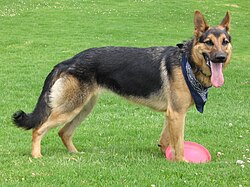ძაღლი
Hello, you have come here looking for the meaning of the word ძაღლი. In DICTIOUS you will not only get to know all the dictionary meanings for the word ძაღლი, but we will also tell you about its etymology, its characteristics and you will know how to say ძაღლი in singular and plural. Everything you need to know about the word ძაღლი you have here. The definition of the word ძაღლი will help you to be more precise and correct when speaking or writing your texts. Knowing the definition ofძაღლი, as well as those of other words, enriches your vocabulary and provides you with more and better linguistic resources.

ძაღლი
Georgian

Etymology
From Old Georgian ძაღლი (ʒaɣli), from Proto-Kartvelian *ʒ₁aɣl-.
Pronunciation
Noun
ძაღლი • (ʒaɣli) (plural ძაღლები)
Inflection
| Declension of ძაღლი (see Georgian declension) | |||
|---|---|---|---|
| singular | plural | archaic plural | |
| nominative | ძაღლი (ʒaɣli) | ძაღლები (ʒaɣlebi) | ძაღლნი (ʒaɣlni) |
| ergative | ძაღლმა (ʒaɣlma) | ძაღლებმა (ʒaɣlebma) | ძაღლთ(ა) (ʒaɣlt(a)) |
| dative | ძაღლს(ა) (ʒaɣls(a)) | ძაღლებს(ა) (ʒaɣlebs(a)) | ძაღლთ(ა) (ʒaɣlt(a)) |
| genitive | ძაღლის(ა) (ʒaɣlis(a)) | ძაღლების(ა) (ʒaɣlebis(a)) | ძაღლთ(ა) (ʒaɣlt(a)) |
| instrumental | ძაღლით(ა) (ʒaɣlit(a)) | ძაღლებით(ა) (ʒaɣlebit(a)) | |
| adverbial | ძაღლად(ა) (ʒaɣlad(a)) | ძაღლებად(ა) (ʒaɣlebad(a)) | |
| vocative | ძაღლო (ʒaɣlo) | ძაღლებო (ʒaɣlebo) | ძაღლნო (ʒaɣlno) |
| Notes: archaic plurals might not exist. | |||
| Postpositional inflection of ძაღლი (see Georgian postpositions) | ||
|---|---|---|
| postpositions taking the dative case | singular | plural |
| -ზე (-ze, “on”) | ძაღლზე (ʒaɣlze) | ძაღლებზე (ʒaɣlebze) |
| -თან (-tan, “near”) | ძაღლთან (ʒaɣltan) | ძაღლებთან (ʒaɣlebtan) |
| -ში (-ši, “in”) | ძაღლში (ʒaɣlši) | ძაღლებში (ʒaɣlebši) |
| -ვით (-vit, “like”) | ძაღლივით (ʒaɣlivit) | ძაღლებივით (ʒaɣlebivit) |
| postpositions taking the genitive case | singular | plural |
| -თვის (-tvis, “for”) | ძაღლისთვის (ʒaɣlistvis) | ძაღლებისთვის (ʒaɣlebistvis) |
| -ებრ (-ebr, “like”) | ძაღლისებრ (ʒaɣlisebr) | ძაღლებისებრ (ʒaɣlebisebr) |
| -კენ (-ḳen, “towards”) | ძაღლისკენ (ʒaɣlisḳen) | ძაღლებისკენ (ʒaɣlebisḳen) |
| -გან (-gan, “from/of”) | ძაღლისგან (ʒaɣlisgan) | ძაღლებისგან (ʒaɣlebisgan) |
| -ადმი (-admi, “in relation to”) | ძაღლისადმი (ʒaɣlisadmi) | ძაღლებისადმი (ʒaɣlebisadmi) |
| postpositions taking the instrumental case | singular | plural |
| -დან (-dan, “from/since”) | ძაღლიდან (ʒaɣlidan) | ძაღლებიდან (ʒaɣlebidan) |
| -ურთ (-urt, “together with”) | ძაღლითურთ (ʒaɣliturt) | ძაღლებითურთ (ʒaɣlebiturt) |
| postpositions taking the adverbial case | singular | plural |
| -მდე (-mde, “up to”) | ძაღლამდე (ʒaɣlamde) | ძაღლებამდე (ʒaɣlebamde) |
Derived terms
- შინაური ძაღლი (šinauri ʒaɣli)
- ენოტისმსგავსი ძაღლი (enoṭismsgavsi ʒaɣli)
- ძაღლიშვილი (ʒaɣlišvili)
See also
- ლეკვი (leḳvi)
Further reading
- Čikobava, Arnold et al., editors (1950–1964), “ძაღლი”, in Kartuli enis ganmarṭebiti leksiḳoni [Explanatory Dictionary of the Georgian language] (in Georgian), Tbilisi: Academy Press
- Orbeliani, Sulxan-Saba (1685–1716) “ძაღლი”, in S. Iordanišvili, editor, Siṭq̇vis ḳona kartuli, romel ars leksiḳoni [Collection of Georgian words, that is a dictionary], Tbilisi: Georgian SSR print, published 1949, page 437b
Old Georgian
Etymology
From Proto-Kartvelian *ʒ₁aɣl-. Compare also ძაღუერი (ʒaɣueri, “stupid, silly, witless”).
Noun
ძაღლი • (ʒaɣli)
Descendants
- Georgian: ძაღლი (ʒaɣli)
References
- Klimov, G. A. (1998) Etymological Dictionary of the Kartvelian Languages (Trends in linguistics. Documentation; 16), New York, Berlin: Mouton de Gruyter, page 283
Further reading
- Abulaʒe, Ilia (1973) “ძაღლი”, in Ʒveli kartuli enis leksiḳoni (masalebi) [Dictionary of Old Georgian (Materials)] (in Georgian), Tbilisi: Metsniereba, page 523
